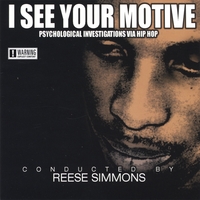Forget about effectiveness for a second. This album is interesting. I mean that in the most mysterious sense, because the marketing ploy of “I See Your Motive” leaves me clueless. Reese Simmons is an author not a rap artist, and the back of this album’s cardboard casing mentions his “controversial book, Spermatozoa.” I cannot find anything about the book except little blurbs speaking on its unorthodox nature, but I gotta say the title of the book is interesting. At the very least, a creative mind seems to be at work.
The sub-title of this album, his first foray into the medium, is “Psychological Investigations Via Hip Hop.” That’s a tall agenda for someone to carry, especially on a rap album, and it seems like more of a collection of buzzwords than anything else. Reese is not above trying to convince his audience that he is the best. In fact, he doesn’t really carry through on this “psychological” aspect at all. His importance is not in the message, but the presentation. This is a rare kind of hip-hop, laid-back where others are too eager. He is out to prove himself, just like everyone else, but he doesn’t feel the rush to do so.
Simmons’ lyrical approach can be summed up with one listen to a specific song, “The Complex.” He evokes several prodding images using the word “complex” in the hook, all pertaining to race. I initially thought he was on to something, and the problems he suggests are weighty. Still, he spends much of the actual song talking the way rappers do, calling out peers that he deems unworthy, albeit in a drawl that he paces more like mood music than rap. There are hints of the higher thought he advertises in the sub-title, but these hints go unfulfilled, photos of his mind instead of movies. The closest he comes to a psychological investigation is “The Tendency,” but even here, he asks vague questions like “who said the black man can’t read?” without investigating further.
The reins of this project belong strictly in Simmons’ hands, and this makes for a unified record on both the production and lyrics front. In dealing with the music, though, Simmons proves way out of his league. All of the production is initially intriguing, with drums traced by soft, relaxed jazz. Most of the songs sound very similar, however, and he never strays from the lethargic smoothness that spreads across “I See Your Motive.” The tempo hardly varies at all, ranging from slow to not-quite-as-slow. This fits perfectly within his rhyme style, which is mirrored flawlessly by the musical pace. The best beat is “Pugilist,” the first song, and this is only because it contains a hint of something bouncier right beneath the surface. Here he doesn’t abandon his intentional vocal hesitancy, but the slightest hitch in the production increases its replay value in light of the rest of the record.
Lyrically, Reese Simmons sometimes borders on spoken word. He paces himself like a senior citizen, and consistently drags out the last syllable of each line for emphasis. The problem with this technique is that it stresses the already languid pace even more. Listening to this album is trying, simply because it moves so slowly and the music is not compelling enough to merit full attention. Simmons’ voice takes center stage, and it is attractively unique. He rhymes slower than Smooth B, and in small doses this is effective. But he’s not saying much of anything that I haven’t heard, so the sedated delivery hinders forward motion. He claims that he is “definition of a new aesthetic,” but this aesthetic is rooted completely in the speed of the music. I can imagine that he would sound better as a more hurried rapper, because more words per minute means less time to pick apart the faults. When he’s inching along, talking about “crab emcees” that stand in his way, I just want him to talk faster.
The most effective moments on this album come when Simmons adopts a sing-song voice. The only difference between this and his rapping is that he actually creates a melody, because his verses are drawn out in the same way a singer might. Regardless, Simmons may be a provocative author, but this does not translate to music. “I See Your Motive” is just too slow, and his thoughts are surprisingly standard and uninspired. Something had to carry the weight, and since the production and the lyrics are rather ordinary, a sense of stagnancy hangs over the entire project.

